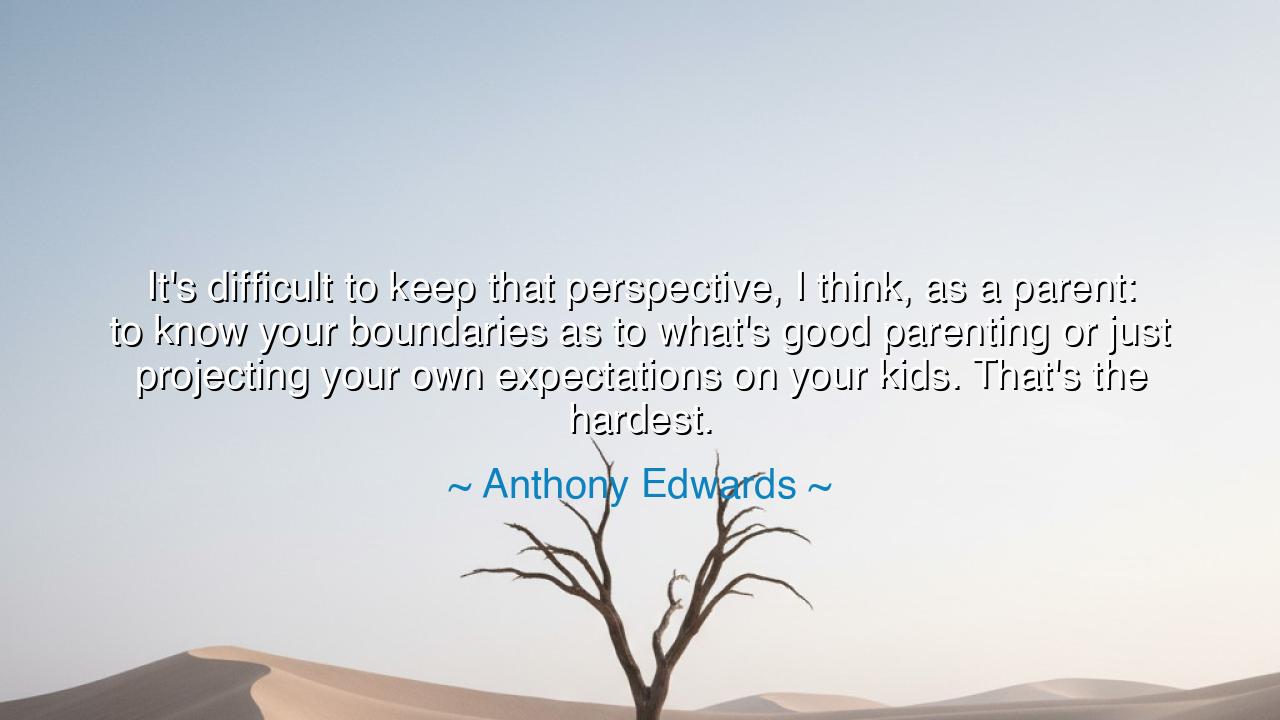
It's difficult to keep that perspective, I think, as a parent:
It's difficult to keep that perspective, I think, as a parent: to know your boundaries as to what's good parenting or just projecting your own expectations on your kids. That's the hardest.






Hear the words of Anthony Edwards, who speaks with honesty about the hidden struggle of every parent: “It’s difficult to keep that perspective, I think, as a parent: to know your boundaries as to what’s good parenting or just projecting your own expectations on your kids. That’s the hardest.” These words reveal a truth as old as time itself—that in the work of raising children, the line between guidance and control is thin, and easily crossed. Parents, out of love, often burden their children with the weight of their own dreams, their own disappointments, their own unfinished battles. Yet the heart of good parenting is not to mold a child into oneself, but to nurture the unique soul that stands before you.
From the beginning of families, this temptation has always existed. Fathers and mothers, remembering their own failures, often sought to correct them through their children. A warrior who never gained glory might demand his son become the soldier he could not be. A mother denied learning might insist her daughter fulfill the education she was refused. These are born from love, but also from pride. Edwards names the danger clearly: when parents project expectations rather than discern a child’s true nature, they mistake possession for parenting, and their children may grow under the weight of another’s shadow instead of the light of their own calling.
History gives us the poignant tale of Leopold Mozart and his son Wolfgang Amadeus Mozart. Leopold, himself a musician, saw the genius in his boy, but also sought to shape it to his own ambitions. He drove Wolfgang mercilessly, sending him across Europe to perform, pushing him to exhaustion. Though his strictness gave the world a prodigy, it also strained the bond between father and son, for Wolfgang longed to compose his own music, not merely serve his father’s vision. Here we see Edwards’ wisdom made flesh: the difficulty of knowing where guidance ends and projection begins, and the cost when boundaries are blurred.
The heart of Edwards’ reflection lies in the word perspective. Parenting is not simply giving rules or lessons—it is the continual effort to see clearly, to step back from the intensity of one’s own desires and ask: Is this for my child, or is this for me? Such clarity is rare, for love blinds as much as it reveals. The parent must cultivate humility, learning to honor their child’s individuality, even when it diverges from their own path. This is indeed, as Edwards says, “the hardest.”
And yet, to wrestle with this difficulty is itself an act of love. The parent who questions their own motives, who wonders whether they are imposing too much, is already striving toward wisdom. For tyranny in the home is born not from reflection but from certainty. The wise parent doubts, examines, and adjusts, knowing that the goal is not to replicate themselves, but to raise a free and whole being. Boundaries in parenting are not walls of coldness, but lines of respect, drawn to protect the child’s right to grow as themselves.
The lesson, then, is clear: love your children as they are, not as you wish them to be. Guide them, yes, but do not chain them to your unfinished story. Offer them tools, not burdens; opportunities, not obligations. When you feel the pull of your own expectations, pause, and ask: Does this serve their spirit, or only my pride? In that pause lies the difference between love and control, between nurture and projection.
Therefore, let every parent who hears these words take action: practice humility, listen deeply, and release your grip upon the future you imagined. Walk beside your children, not in front of them, and honor the mystery of who they may become. For their lives are not extensions of yours, but their own sacred journeys.
Thus, Anthony Edwards’ words, spoken with candor, echo the wisdom of the ancients: the hardest task of parenting is not the labor of provision, nor the discipline of correction, but the restraint of love—the ability to let children grow into themselves, and not into your shadow. In mastering this, the parent not only raises a child, but also grows themselves in patience, humility, and wisdom.






AAdministratorAdministrator
Welcome, honored guests. Please leave a comment, we will respond soon